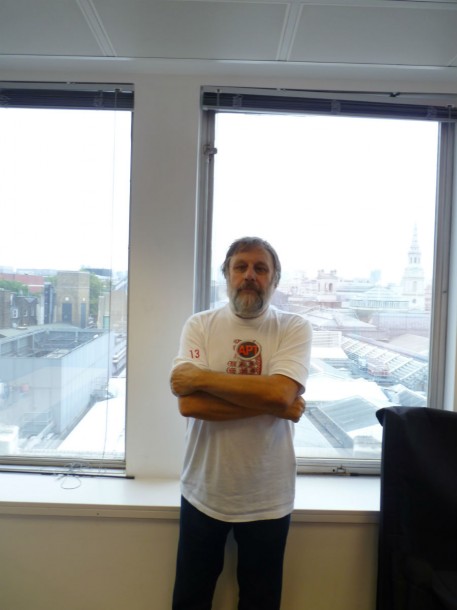This weekend Brixton played host to the controversial and celebrated radical philosopher and cultural theorist Slavoj Žižek. On Friday The Ritzy aired the UK premiere of The Pervert’s Guide to Ideology, a film by director Sophie Fiennes (sister to Ralph) starring the Slovenian marxist academic, including a lively and beautifully sprawling Q&A session afterwards with Žižek. Our Deputy Editor Luke Massey caught up with the man himself to talk gentrification, riots, local economies and David Bowie.

Žižek has achieved global notoriety as a critical philosopher, an avowed communist, and a humorous and iconoclastic cultural critic. His love of film and his critical analyses were captured in a collaboration with Fiennes in 2006: The Pervert’s Guide to Cinema. Now, seven years on, Žižek returns to lay bare the ‘ideology’ present in our everyday lives, through a deconstruction of films from James Cameron’s Titanic to The Sound of Music.
‘Traditionally, the idea is that ideology more or less died in 1990, whereby by ideology people mean some big social, political, project to be realised. Mostly, our ideologies no longer work in this way. The way we, everyday people, are addressed by social authority, whatever we call it – it’s no longer telling us “sacrifice your life” for British empire, for socialism, whatever. It’s not. It’s some kind of permissive bullsh*t basically. Society is telling us, like, be true to yourself, authentic, develop your potential, be kind to others. It’s kind of, what I ironically call, a slightly enlightened Buddhist hedonism.’
Žižek believes that ideology is embedded in the consumerism and pursuit of pleasure which surrounds us: we are bombarded with imagery and messages which enforce a contented placidity – while systems of oppression, insatiable corporations, and the social and economic marginalisation of people is able to continue unabated.
‘You get the pleasure’ says Slavoj, but ‘what is invisible is precisely the injunction, the grey ideological message.’ He is referring to the ‘ingenuity’ of the late 80’s John Carpenter classic ‘They Live’, footage of which provides the opening scenes of The Pervert’s Guide to Ideology. Here, a drifter played by former wrestler “Rowdy” Roddy Piper discovers a box of sunglasses which uncover the true form of society. Billboards advertising holidays and selling sex are really grey messages reading: ‘Obey’, ‘Consume’, ‘Marry and reproduce’, and of course, on money: ‘This is your God’.
‘I want to make people wonder,’ Slavoj says. ‘Not to accept automatically things that go on around them every day.’

In the wake of the London riots in 2011, Žižek decried the absence of any kind of programme amongst the rioters. Writing in the London Review of Books he described it as a ‘zero-degree protest, a violent action demanding nothing.’
He now tells me that perhaps he was ‘a little too harsh there’ and that friends have convinced him that ‘nonetheless, the very fact that it was a collective event and so on has a certain emancipatory value.’ I ask his view of the Brixton riots in the 1980s – knowing his often derisory take on a focus on ‘race’ and ‘identity’. Are race riots a distraction from the ‘real war, as it were, the class war’?
‘No no no – here I got the postmodern lesson. The greatest catastrophe is to say “we have to wait for the big, real, struggle”. No – NO! We should fight race wars… in a good sense!!’ Žižek laughs nervously – presumably about the way in which that soundbite could be quoted out of context.
‘But what we should nonetheless always bear in mind is that race tensions are always mediated – they’re a form of expression, over-determined by other economic issues. It’s meaningless to talk about race tensions without talking economy, exploitation, and so on and so on. That’s the only thing. Because otherwise we end up with American cultural studies, which totally depoliticised the economised race struggle and the problem becomes… this kind of a problem of collective self-psychoanalysis. This is why, incidentally as you probably know, I also reject furiously the term of “tolerance” – as if races struggle in a fight for “tolerance”. And I do my usual, simple, argument. I looked at Martin Luther King’s speeches – he never even uses the word tolerance – for him it would be something shameful to say “we blacks want more tolerance from whites”.’
I describe the processes of gentrification going on in Brixton at the moment – and the fierce debate around this. My very presence in Brixton, I tell him, as a white middle class person, is a part of this process.
He offers a typically Žižekian approach:
‘As to gentrification: I am of course against it insofar as it means a foreign class comes from outside and pushes local people out, destroying their way of life. On the other hand, I often encounter in the United States a protest against gentrification which is a typical upper-middle class protest, you know? They don’t live there, but they feel like going there for a weekend to get authentically in touch with ordinary people… So if gentrification means – I don’t know, better street services, f*ck it – I’m for gentrification!’
We get onto community projects and local economies – discussing the Brixton Pound as a model for supporting local independent businesses. Is this something Žižek sees as a sustainable system?

‘Here I’m also mixed. Insofar as it works, and makes it better – ordinary life. Because I always have respect for ordinary problems of local people… But the problem is this one. You know we should, nonetheless, at the same time, think also in larger terms. If not, by organising these pockets of autonomy, you just enable the system to avoid conflicts and to function even better. So again, yes it should be done but you know, like very carefully – not carefully in the sense “don’t do it too much” – do it as much as you can I totally support it, but – how should I put it – try not to play the game of really making it easy. You know? Because for example imagine today’s government: if all the local communities were to organise these autonomous pockets it would be wonderful for them. It basically means the poor will take care of themselves… You know what I mean? That’s all I’m saying.’
Finally we talk music and I want to get Žižek’s thoughts on Brixton’s famous son David Bowie. It’s not good.
‘I will never forget – I don’t know where he is now politically, but in a stupid interview to Playboy some 30 or 20 years ago [it was 1976] – David Bowie expressed his sympathies for Hitler. Now, with all my sense of irony, obscenity, you know, even I have certain limits. Sorry – you don’t play with that.’
But then, as someone who has a picture of Stalin on his wall in his home – he says it’s to mess with journalists – is Žižek in a position to take this moral stance?
‘We have the right to criticise everything about Stalin: he was a nightmare. Only one thing he did well: let’s face it, he was the one, and the only one, of all communist leaders of whom the West, the imperialists, were really afraid. He scared them. You know? And that’s what I like about Stalin. The only thing I like, you know.’
The Pervert’s Guide to Ideology is now showing in cinemas around the UK: but where better to see it than The Ritzy?

















[…] series seemed to suggest that the issues of Angell Town were both unique to it and in isolation to Brixton’s gentrification and Lambeth Council and London and the fault of the people living there rather than the consequence […]
Did your raise the point about Zizek’s Stalin portrait after his criticism of Bowie’s remark?
Hitler scared the West, too. I’m not sure Z can criticize Bowie without iloking like a hypocrite
Well played.
There is nothing controversial about Slavoj Zizek.
He just makes sense
Good article but essentially a promo piece. The bit about gentrification was scant and flippant nonsense.
Thanks Dexter.
The reason that I met Slavoj at all is precisely because he was doing the film launch at The Ritzy – so in that sense it’s natural that I’d talk about the film. But I don’t agree that it’s essentially a promo piece: I tried to get his perspective on local issues, among other things.
I agree that the bit on gentrification doesn’t stack up as well. Gentrification is much more about displacement of communities than about renovation of public services: which could certainly happen without rocketing rents/house prices and the destruction of livelihoods. But he said it, and I reported it! Thanks for reading though!
Hey! Sounds great. And I really LOVE the poster – would it be possible for me to find out who did it?
Hey Katie – yeah I absolutely love the artwork. I’m not sure who produced it but if I find out I’ll let you know!
Hi again Katie – I’ve found out who made the movie poster. It’s an American illustrator called Akiko Stehrenberger – here’s her website: http://akikomatic.com/